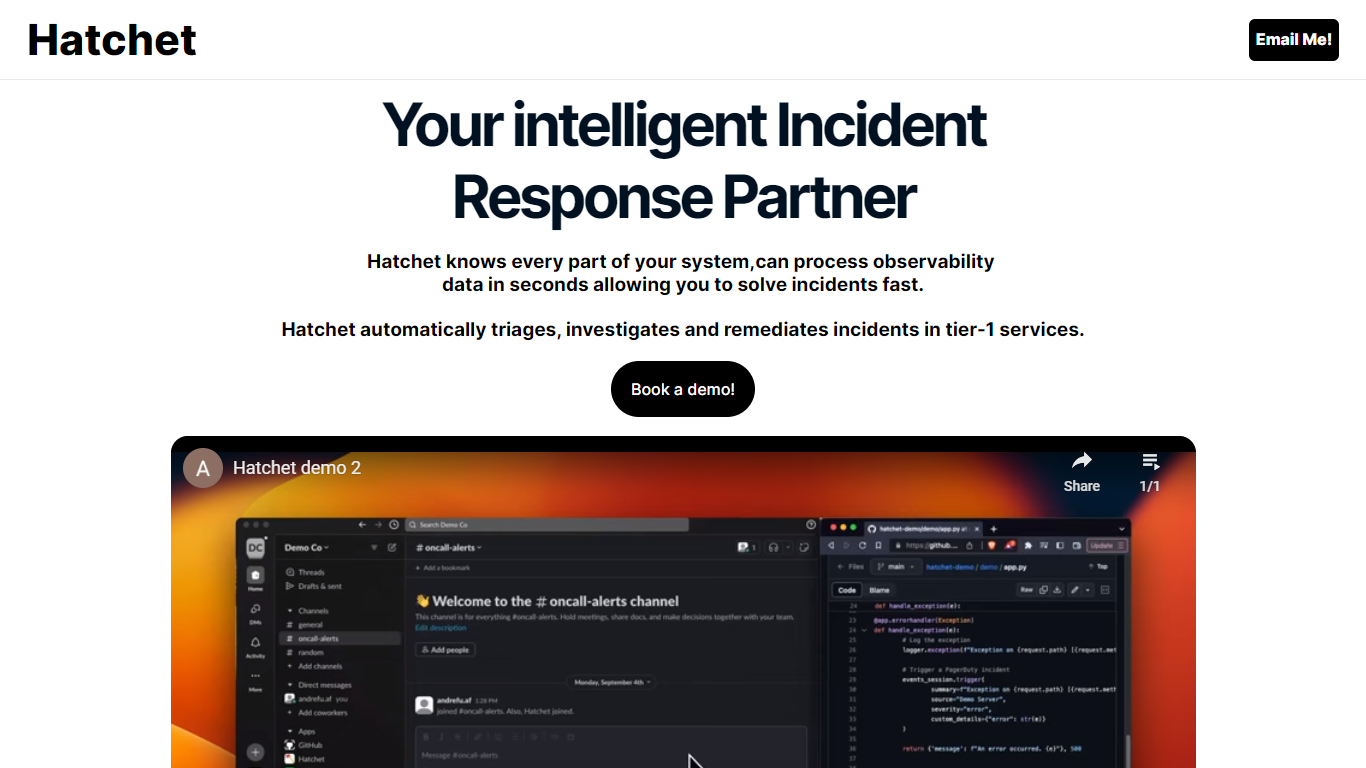Hatchet vs Codex
In the contest of Hatchet vs Codex, which AI Code Assistant tool is the champion? We evaluate pricing, alternatives, upvotes, features, reviews, and more.
If you had to choose between Hatchet and Codex, which one would you go for?
When we examine Hatchet and Codex, both of which are AI-enabled code assistant tools, what unique characteristics do we discover? Hatchet stands out as the clear frontrunner in terms of upvotes. Hatchet has received 6 upvotes from aitools.fyi users, while Codex has received 4 upvotes.
Not your cup of tea? Upvote your preferred tool and stir things up!
Hatchet

What is Hatchet?
Hatchet is your go-to AI companion designed to streamline incident responses for on-call engineers—offering a swift and smart solution to triage, investigate, and deploy fixes faster. This intelligent system understands every part of your infrastructure, processing observability data in mere seconds, so you can resolve issues rapidly and efficiently. With its ability to automatically triage, investigate, and remediate incidents, especially in critical tier-1 services, Hatchet injects relevant context into incidents to save time and resources.
For enhanced data security, Hatchet is deployed as an on-premises, self-hosted solution with robust security features—including Code Llama 2, no telemetry, permissions management, audit trails, single sign-on (SSO), and version control—ensuring your data remains within your virtual private cloud (VPC). Hatchet boasts easy integration into any alerting system by calling it at the service's entrypoint and pointing it to the log file, after which it takes over to work its magic.
Codex

What is Codex?
OpenAI Codex is an AI system that translates natural language into code, now generally available with new features for developers and teams. It powers GitHub Copilot and supports over a dozen programming languages including Python, JavaScript, Go, and more. Codex can interpret simple English commands and execute them, enabling natural language interfaces to software and APIs.
The latest version, GPT-5-Codex, offers faster and more accurate coding assistance, accessible via an API and a new SDK that integrates the Codex agent into custom workflows and apps. Codex also features a Slack integration, allowing teams to delegate coding tasks and get answers directly within Slack channels.
Administrators benefit from enhanced tools like environment controls, usage monitoring, and analytics dashboards to manage Codex usage at scale. Codex is used globally by startups and enterprises alike to speed up code reviews, automate code cleanup, and reduce manual coding effort.
Technically, Codex has a larger memory for Python code (14KB) than its predecessor GPT-3, allowing it to consider more context when generating code. It runs as a cloud-based agent and also offers a local CLI tool for coding assistance in terminal environments.
OpenAI continues to improve Codex’s safety and reliability, scaling access carefully while supporting developers with documentation and community resources. Codex lowers barriers to programming by automating repetitive tasks and helping users map problems to existing code efficiently.
Hatchet Upvotes
Codex Upvotes
Hatchet Top Features
Automated Triage & Investigation: Automatically processes incidents, streamlining the workflow of resolving issues.
Data Security: Ensures data security with 100% on-prem training and zero telemetry for in-VPC data privacy.
Intelligent Context Injection: Provides relevant context into incidents to save time and minimize resource expenditure.
Rapid Problem Resolution: Capable of ingesting logs, codebases, and knowledge hubs for instant issue resolution.
Easy Integration: Offers effortless integration into alerting systems for streamlined incident handling.
Codex Top Features
🧑💻 Multi-language support: Works with Python, JavaScript, Go, and more to assist diverse coding needs.
⚙️ Codex SDK: Embed Codex’s coding agent into your own apps and workflows for custom automation.
💬 Slack integration: Assign coding tasks and get answers directly within Slack channels.
📊 Admin tools: Manage usage with environment controls and analytics dashboards for teams.
🚀 Code review automation: Speeds up pull request reviews and detects issues early to improve code quality.
Hatchet Category
- Code Assistant
Codex Category
- Code Assistant
Hatchet Pricing Type
- Freemium
Codex Pricing Type
- Freemium
